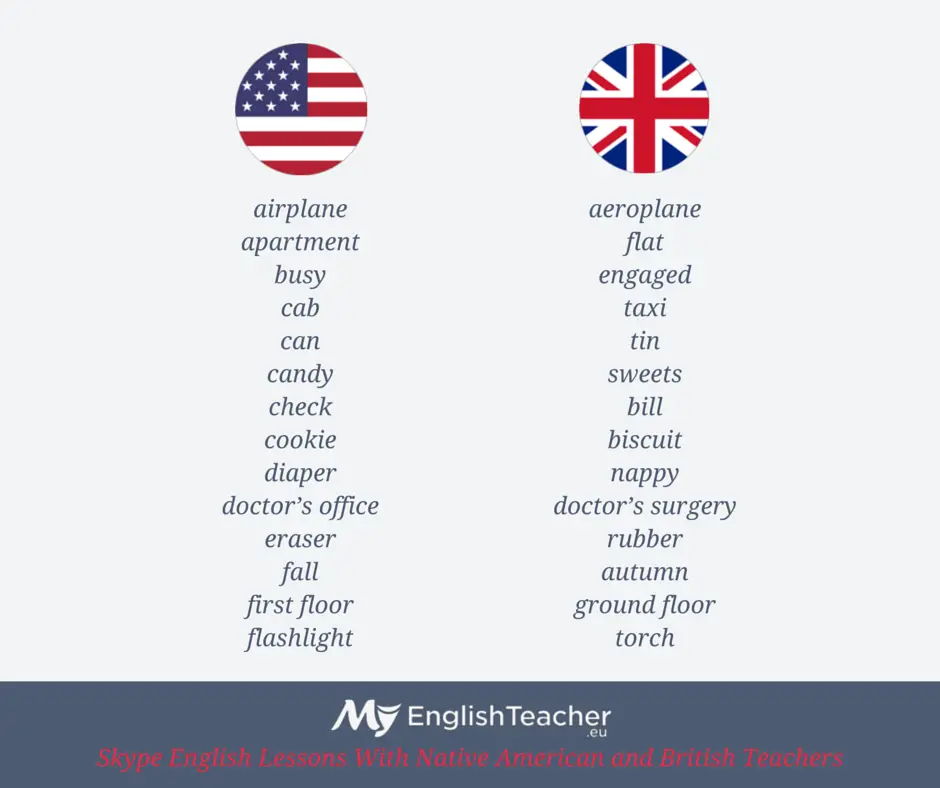
As the saying goes: “The British and the Americans are two nations divided by a common language.” Good news is, the two varieties are so similar that people have usually no difficulty understanding each other, regardless of which side of the Atlantic they’re from.
ACCENTS
The most noticeable difference for foreigners is usually the accent. Not only two accents; there are many local dialects in both countries with distinctive accents. However, words are pronounced very similarly, so this is rarely a problem.
Watch this video for some examples:
British English vs. American English: Pronunciation
DIFFERENCES IN GRAMMAR
have vs have go
In Britain, the form ‘have got’ is often used informally to talk about possession:
- I’ve got an idea. (BrE)
- I have an idea. (AmE)
- Have you got a pen? (BrE)
- Do you have a pen? (AmE)
- I haven’t got any money. (BrE)
- I don’t have any money. (AmE)
And to talk about obligation:
- I’ve got to go. (BrE)
- I have to go. (AmE)
Present Perfect vs Past Simple (yet, already, just)
In the US, Past Simple is the preferred form:
- Have you called Dave yet? (BrE)
- Did you call Dave yet? (AmE)
- I haven’t called him yet. (BrE)
- I didn’t call him yet. (AmE)
- I’ve already called him. (BrE)
- I already called him. (AmE)
- I’ve just called him. (BrE)
- I just called him. (AmE)
Collective Nouns
Collective nouns are always followed by singular verbs in AmE, however, in BrE they may be followed by both singular and plural verbs depending on whether they are seen as a unit or as individuals.
- My family are religious. (BrE)
- My family is religious. (AmE)
- Their team are winning. (BrE)
- Their team is winning. (AmE)
Past Tense Form
There are a few verbs that have different forms in Past Simple and/or Past Participle. Here are the most common ones:
- bust- bust- bust (BrE)
- bust- busted- busted (AmE)
- get- got- got (BrE)
- get- got- gotten (AmE)
- learn- learnt- learnt (BrE)
- learn- learned- learned (AmE)
- prove- proved- proved (BrE)
- proved- proved- proven (AmE)
- smell- smelt- smelt (BrE)
- smell- smelled- smelled (AmE)
- spill- spilt- spilt (BrE)
- spill- spilled- spilled (AmE)
DIFFERENCES IN VOCABULARY
Differences in vocabulary are the most numerous and possibly the most confusing. Some things have different names, or the same words might have different meanings in AmE and BrE. There are also some differences in spelling. You can see some of the most common examples below:
[Tweet “American vs British Spelling: centre (BrE) center (AmE), theatre (BrE) theater (AmE), calibre (BrE) caliber (AmE), fibre (BrE) fiber (AmE)”]
Spelling
- centre (BrE)
- center (AmE)
- theatre (BrE)
- theater (AmE)
- calibre (BrE)
- caliber (AmE)
- fibre (BrE)
- fiber (AmE)
- metre (BrE)
- meter (AmE)
- colour (BrE)
- color (AmE)
- flavour (BrE)
- flavor (AmE)
- behaviour (BrE)
- behavior (AmE)
- labour (BrE)
- labor (AmE)
- humour (brE)
- humor (AmE)
- catalogue (BrE)
- catalog (AmE)
- dialogue (BrE)
- dialog (AmE)
- programme (BrE)
- program (AmE)
- defence (BrE)
- defense (AmE)
- licence (BrE)
- license (AmE)
- analyse (BrE)
- analyze (AmE)
- appetiser (BrE)
- appetizer (AmE)
- cosy (BrE)
- cozy (AmE)
- localise (BrE)
- localize (AmE)
- maximise (BrE)
- maximize (AmE)
- emphasise (BrE)
- emphasize (AmE)
- energise (BrE)
- energize (AmE)
- baptise (BrE)
- baptize (AmE)
- likeable (BrE)
- likable (AmE)
- jewellery (BrE)
- jewelry (AmE)
- judgement (BrE)
- judgment (AmE)
- yoghurt (BrE)
- yogurt (AmE)
[Tweet “American vs British Vocabulary: aeroplane (BrE) airplane (AmE), flat (BrE) apartment (AmE), engaged (BrE) busy (AmE), taxi (BrE) cab/ taxi (AmE)”]

Vocabulary
- aeroplane (BrE)
- airplane (AmE)
- flat (BrE)
- apartment (AmE)
- engaged (BrE)
- busy (AmE)
- taxi (BrE)
- cab/ taxi (AmE)
- tin (BrE)
- can (AmE)
- sweets (BrE)
- candy (AmE)
- bill (restaurant) (BrE)
- check (AmE)
- biscuit (BrE)
- cookie (AmE)
- sweet corn/ maite (BrE)
- corn (AmE)
- nappy (BrE)
- diaper (AmE)
- doctor’s surgery (BrE)
- doctor’s office (AmE)
- lift (BrE)
- elevator (AmE)
- rubber (BrE)
- eraser (AmE)
- autumn (BrE)
- fall (AmE)
- tap (BrE)
- faucet (AmE)
- ground floor (BrE)
- first floor (AmE)
- torch (BrE)
- flashlight (AmE)
- chips (BrE)
- french fries (AmE)
- rubbish (BrE)
- garbage (AmE)
- dustbin (BrE)
- garbage can (AmE)
- petrol (BrE)
- gas(oline) (AmE)
- motorway (BrE)
- highway (AmE)
- crossroads (BrE)
- intersection (AmE)
- post (BrE)
- mail (AmE)
- film (BrE)
- movie (AmE)
- single ticket (BrE)
- one-way ticket (AmE)
- return ticket (BrE)
- round trip (AmE)
- trousers (BrE)
- pants (AmE)
- handbag (BrE)
- purse (AmE)
- crisps (BrE)
- chips (AmE)
- pavement (BrE)
- sidewalk (AmE)
- trainers (BrE)
- sneakers (AmE)
- underground (BrE)
- subway (AmE)
- lorry (BrE)
- truck (AmE)
- holiday (BrE)
- vacation (AmE)
- windscreen (BrE)
- windshield (AmE)
- banknote (BrE)
- bill (AmE)
- aubergine (BrE)
- eggplant (AmE)
- courgette (BrE)
- zucchini (AmE)
- off licence (BrE)
- liquor store (AmE)
- dummy (BrE)
- pacifier (AmE)
- parcel (BrE)
- package (AmE)
- waistcoat (BrE)
- vest (AmE)
- vest (BrE)
- undershirt (AmE)
- flannel (BrE)
- washcloth (AmE)
- zed (z) (BrE)
- zee (AmE)
I hope you find the above examples useful. Keep in mind that while both varieties are correct, your teachers may mark your choice of word or grammar as incorrect depending on where they are from. Stylistically, the best thing to do is choose one variety and keep using it consistently.
Read more:
55 Most Commonly Used British and American Slang Words and Their Meanings
Difference between British and American Uncountable Nouns
Difference Between British and American Spelling (Infographic)


























